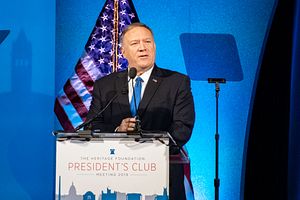The field of Quad-ology has grown quite a bit since the low-key, November 2017 Manila meeting at the working-level of diplomats from the United States, Japan, Australia, and India. Within two years of that meeting, the four like-minded democracies held a foreign minister-level meeting in New York City, on the sidelines of the United Nations General Assembly this September.
The Quad is growing in prominence, but it remains widely misunderstood — or rather, it meant different things to different people. For instance, back in November 2017, officials in India described the renewed Quad effort — a rekindling of a late-aughts idea that can be credited to Shinzo Abe’s first nonconsecutive prime ministerial term in Japan from 2006-2007 — as “not a strategic alliance aimed against someone, but a balancing approach to foreign policy.”
Similarly, officials in the other Quad countries took pains to emphasize that the initiative was largely a consultation between four like-minded democracies with interests in the Asia-Pacific (or rather, now the Indo-Pacific). It was not the start of an Asian NATO and it certainly wasn’t about containing China. Rather than being against something, the Quad was a positive assertion by these four countries of their mutual interest in sustaining the status quo regional architecture.
This discourse around the Quad was given a jolt last week when U.S. Secretary of State Mike Pompeo described the group’s endeavor in a heavily China-focused frame in a speech at the Heritage Foundation. “We’ve reconvened “the Quad” – the security talks between Japan, Australia, India and the United States that had been dormant for nine years,” Pompeo said. “This will prove very important in the efforts ahead, ensuring that China retains only its proper place in the world.”
The word “contain” doesn’t appear in his remarks, which came just days before U.S. Vice President Mike Pence’s second policy speech on U.S.-China relations, but Pompeo might have said as much. Is this a sign that the euphemisms around the Quad are beginning to slip?
In China, Pompeo’s remarks will be read as just that: vindication that the Quad was, has been, and will be the basis for a balancing coalition against greater Chinese influence in the Asia-Pacific. In private, this may also make private consultations between China and the three non-U.S. Quad partners more challenging.
Beijing’s relationships with Australia, India, and Japan are far from being in an overtly competitive frame; Chinese officials are likely to seek clarification on whether Canberra, New Delhi, and Tokyo endorse Pompeo’s frame that the Quad is about “ensuring” China’s “proper place” in world affairs.
The description of the Quad as “security talks” also understates the scope of the group’s consultations. The ongoing post-November 2017 Quad began with a wide agenda, focusing on several topics that wouldn’t fall under the ambit of hard security issues such as connectivity, respect for international law, and values.
But Pompeo’s move away from euphemism in discussing the Quad might end up giving the initiative greater definition and clarify. After all, a consultative mechanism, while useful, has its inherent limitations. The Quad’s critics who write off the entire effort as a meaningless talk-shop have advocated this kind of a clarification.
Where Pompeo errs is in positing that China can be persuaded to “retain only its proper place.” In the future, if U.S. discourse on the Quad is to be more honest about what might be possible, the better frame would be to move away from “containment” and frame the Quad’s role in U.S. strategy as being about constraining China’s strategic options in Asia.

































